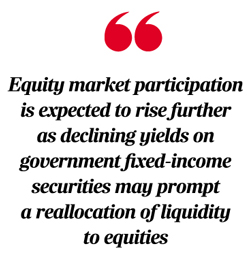Equity rally hinges on cooling inflation, stable forex market
Say EBL Securities, BRAC EPL Stock Brokerage as they give a review of the monetary policy for H1 of FY26

Published :
Updated :

Despite the tight monetary policy to be maintained for July-December this year, EBL Securities has predicted a positive capital market outlook, relying on the falling yields of government bonds.
Although the central bank kept the policy rate unchanged at 10 per cent, declining yields on government fixed-income securities signal market expectations of potential monetary easing in the near term, said EBL Securities, in its review on the latest.
The interest rates on Treasury bills and bonds have been showing a downward trend, having fallen from over 12 per cent to about 10 per cent within the last two months.

That suggests a positive outlook for the equity market, contingent on the continuation of cooling inflation and sustained forex market stability, reads the EBL Securities' review
The equity market has been gaining upward momentum, with the benchmark index surpassing 5,500-mark after 10 months on Sunday amid improving macroeconomic factors, such as healthy foreign exchange reserves, rising exports, and record remittance inflows.
The market turnover also surpassed Tk 11 billion for the first time in a year on the Dhaka bourse as local investors and foreign fund managers started pouring funds in stocks.
"Equity market participation is expected to rise further as declining yields on government fixed-income securities may prompt a reallocation of liquidity to equities," said the EBL Securities.
The central bank has aligned its gross domestic product (GDP) growth and inflation targets with the government's objective of achieving 5.5 per cent GDP growth and containing inflation within 6.5 per cent by the end of the current financial year.
With inflation control remaining the top priority, the BB has continued its tight monetary stance. However, the BB hinted that if the inflation rate continues to decelerate and falls below 7.0 per cent, the policy repo rate may be revised down.
Meanwhile, inflation slid to 8.48 per cent in June, lowest in 35 months and down 0.57 percentage points month-on-month, owing to a set of deliberate policy actions by the central bank.
"We expect inflation to ease further, paving the way for gradual rate softening and a pickup in credit growth," said BRAC EPL Stock Brokerage, another leading stockbroker, in its monetary policy review.
The exchange rate is anticipated to remain stable, with central bank interventions aimed at curbing volatility in the forex market.
The BB has been allowing market-driven exchange rates since May this year, with limited interventions to mitigate excessive volatility and reinforce stability.
Under the new regime, the interbank taka-dollar rate stabilised at Tk 122.77 by June, with depreciation moderating to 3.89 per cent in FY25 from 8.17 per cent in FY24.
The central bank's move to a more flexible, market-based foreign exchange regime is a step in the right direction, aimed at better aligning the taka with market fundamentals and restoring market confidence, said the BRAC EPL.
"Exchange rate stability, combined with currently attractive equity valuations, may help in restoring foreign investor confidence," said EBL Securities.
Listed companies with significant import dependency are expected to experience improved profitability, supported by stability in the exchange rate, said EBL Securities.
However, prevailing political uncertainty may continue to weigh on foreign investor sentiment, prompting a cautious approach.
Subdued private sector credit growth, combined with the continuation of high-interest rate environment and prevailing political uncertainty, is expected to constrain capacity expansion by listed firms, making the earnings momentum sluggish, according to EBL Securities.
Interest expense of highly-leveraged listed companies will remain high and continue to weigh on their earnings as the policy rate remains unchanged. However, companies with substantial fixed deposit holdings will benefit from higher interest income.
Banks and non-bank financial institutions (NBFIs) are expected to benefit from the high-interest rate regime through higher net interest margins.
Also, the financial institutions having substantial investments in government fixed-income securities are expected to realize mark-to-mark gains amid declining yields, which will provide an additional boost to earnings in the upcoming period.
Real estate and construction sector companies are anticipated to continue facing subdued housing demand and delays in project financing, mainly due to the prolonged high-interest rate environment and sluggish private sector credit growth.
Meanwhile, structural reform initiatives, such as Risk-Based Supervision (RBS) and Asset Quality Review (AQR), are likely to restore good governance and investor confidence.
The central bank also introduced comprehensive loan classification and provisioning guidelines in alignment with international best practices.
To further strengthen the resilience of the banking sector, the BB has also announced a roadmap to implement expected credit loss (ECL)-based loan provisioning by 2027 in line with the International Financial Reporting Standard. "While this is expected to strengthen risk management and transparency, it may initially lead to a rise in reported non-performing loans (NPLs)," said the EBL Securities.
Meanwhile, Bangladesh recorded a balance of payments surplus of $3.29 billion in FY25, supported by rising remittances, firm export growth, external aid inflows, and modest import expansion.
Remittances hit a record high of $30.3 billion, growing 26.8 per cent year-on-year in FY25, supported by a competitive market-driven exchange rate, tighter controls on unofficial channels, and better access to agent banking and mobile financial services.
Exports expanded by 8.6 per cent year-on-year to $48.3 billion in FY25, aided by strong RMG demand and solid export growth of leather, footwear, and plastic products.
"We anticipate a better trade situation over export and remittance growth over a flexible exchange rate.
As economic activities rebound, import could also pick up pace," said BRAC EPL Stock brokerage.
babulfexpress@gmail.com


 For all latest news, follow The Financial Express Google News channel.
For all latest news, follow The Financial Express Google News channel.